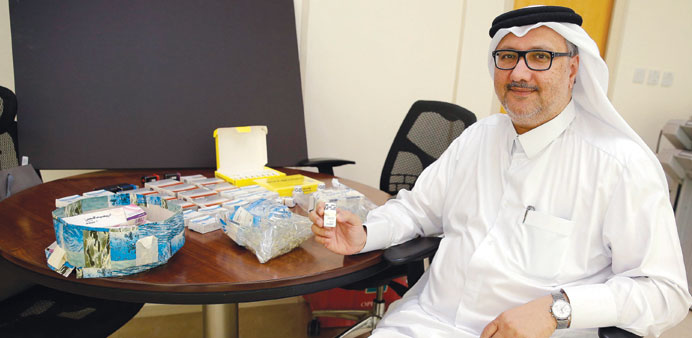Four separate consignments of substances prohibited in sports were seized in March by the Customs Authority at Hamad International Airport, said Dr Nasser al-Ansari, vice chairman of the Qatar National Anti-Doping
Commission (QNADC).
The consignments have been turned over to the QNADC.
The latest consignment of seized substances consisted of growth hormones, anabolic agents, and testosterone – substances banned by the World Anti-Doping Agency (WADA) in a variety of sports.
“This consignment in particular was likely to be used by amateur bodybuilders who often organise small tournaments amongst themselves,” said Dr al-Ansari.
According to Dr Fatima al-Malki, executive director, QNADC, the commission usually receives eight to nine seized consignments a year from the Customs Authority, so this year’s number of consignments of prohibited substances indicates a marked increase over previous years.
“The first step in seizing these substances is the Customs Authority at Hamad International Airport,” Dr al-Malki said, adding, “Customs then turn these consignments over to the Pharmacy and Drug Control unit of the Supreme Council of Health who then transfers the substances to the QNADC headquarters in the Olympic Tower where they are stored for eight months should they be needed as evidence.”
Founded by the Qatar Olympic Committee (QOC) in March 2007, the QNADC is a crucial part of Qatar’s sporting infrastructure. The QNADC’s role is to carry out the anti-doping function on behalf of the QOC and act as the independent anti-doping agency for Qatar. In an effort to further augment Qatar’s commitment to anti-doping, the Anti-Doping Lab Qatar (ADLQ) was founded in December 2007 and is expected to attain full WADA accreditation this year.
Commenting on the QNADC’s relationship with the ADLQ, Dr al-Ansari said, “We work independently from the Anti-Doping Lab Qatar so that there is never a conflict of interests. This is the case in leading anti-doping countries abroad, such as the UK and France for example. The ADLQ is doing tremendous work and we all look forward to it achieving full WADA accreditation soon. In the meantime, we have been sending our samples abroad to other fully-accredited labs, as per WADA’s requirements.”
The QNADC is composed of a therapeutic use exemption committee (TUE) and a result management committee. The TUE committee is composed of physicians who assess the validity of athletes’ use of
prescription medicine.
“The TUE committee serves a very sensitive role within the QNADC,” Dr al-Ansari said, adding, “They must decide that the athletes actually need the medicine they are taking and that the dosage is correct for said usage.”
The result management committee is composed of a disciplinary panel, which investigates athletes caught using prohibited substances and issues the appropriate sanctions, and an appeals panel, to which athletes can submit their appeal within 14 days of the former panel’s decision.
Currently, there is no law in Qatar that penalises import or use of substances prohibited by WADA.
“We’ve already completed drafting a law that will ban import by individuals of prohibited substances such as the ones we have received today. The law will also penalise the use of these substances and will enact harsher sanctions against sport staff caught using or importing them,” said Dr al-Malki.
The draft law, which is due to be submitted to the Qatar’s Cabinet of Ministers, will ban athletes, coaches and technical staff caught using or importing prohibited substances. “This ban will be from all aspects of sports so that, for example, technical staff banned from one sport cannot work in
another sport,” he explained.
Another core objective of the QNADC is to educate athletes, as well as the general public, on the hazards of doping. To this end the QNADC has published a variety of literature targeting various age groups all with the aim of raising awareness on the massive health risks associated with doping. The latest use of this literature was during the finals of Schools Olympic Programme, a multisport competition targeting schoolchildren aged 5 to 18 from across Qatar.
“The problem is that a lot of these athletes just don’t grasp how bad these substances are for them, and the damage they do to their bodies,” Dr al-Ansari said, adding, “They’re still young so their bodies can take a lot of abuse, but at some point they will suffer gravely for doping and unfortunately at that point it is often far too late. This is why it is incredibly important for us to inform every one of the dangers of doping.”

Dr Nasser al-Ansari displays the seized substances.
